 Petzlover
Petzlover Indian Bull Terrier is originated from United Kingdom but Wetterhoun is originated from Netherlands. Both Indian Bull Terrier and Wetterhoun are having almost same height. Both Indian Bull Terrier and Wetterhoun are having almost same weight. Both Indian Bull Terrier and Wetterhoun has same life span. Both Indian Bull Terrier and Wetterhoun has almost same litter size. Indian Bull Terrier requires Low Maintenance. But Wetterhoun requires Moderate Maintenance
Indian Bull Terrier is originated from United Kingdom but Wetterhoun is originated from Netherlands. Both Indian Bull Terrier and Wetterhoun are having almost same height. Both Indian Bull Terrier and Wetterhoun are having almost same weight. Both Indian Bull Terrier and Wetterhoun has same life span. Both Indian Bull Terrier and Wetterhoun has almost same litter size. Indian Bull Terrier requires Low Maintenance. But Wetterhoun requires Moderate Maintenance
 Not much is known of the dog breed crossings that James Hinks carried out to get the Indian Bull Terrier. It is believed that he used the old English Bulldog, the English White Terrier and even the Dalmatian and Greyhound.
Not much is known of the dog breed crossings that James Hinks carried out to get the Indian Bull Terrier. It is believed that he used the old English Bulldog, the English White Terrier and even the Dalmatian and Greyhound.
The dog comes from the UK but was later introduced to India. The Indian Bull Terrier, known as the Indian gladiator was introduced to India by the British Colonial Forces. The dog was developed from British dogs, namely Irish and English strains of the Staffordshire Bull Terrier, the original English White Terrier and the Hinks Bullterrier breed. The legacy of Hinks is known worldwide – he is known as the one who mixed white terriers to bull dogs to make bull terriers. He made a breed that was the base breed of the egg shaped head bull terriers we see today.
The dog is similar in looks to the old type English Bullterrier. The dog has always been valued as a fighter and as a watchdog.
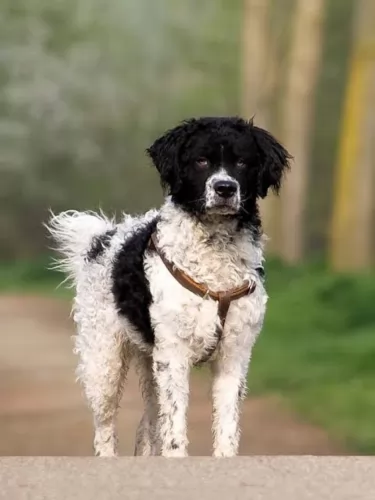 The Wetterhoun is a water dog developed in the 1500 or 1600s to hunt otters. The breed was developed by the Frisians in the Netherlands near the Northwest corner. In addition to catching otters in the lakes near by, they were also used as gundogs to hunt game. They are a fearless, tough and loyal working dog. They love the water and they are build for it with a waterproof coat and tight tail that is spiraled. They will swim happily in freezing cold weather as well.
The Wetterhoun is a water dog developed in the 1500 or 1600s to hunt otters. The breed was developed by the Frisians in the Netherlands near the Northwest corner. In addition to catching otters in the lakes near by, they were also used as gundogs to hunt game. They are a fearless, tough and loyal working dog. They love the water and they are build for it with a waterproof coat and tight tail that is spiraled. They will swim happily in freezing cold weather as well.
The Wetterhoun is rare and not seen outside of the Netherlands. Descendent of the Water Dog, that is now extinct, he is probably a relative of many spaniel types that also call the Water Dog their ancestor. Yet the Wetterhoun is not a spaniel or spaniel type.
The breed almost disappeared during World War II, like many others, they brought back and are now becoming more and more popular. The breed is only recognized by the Federation Cynologique Internationale and the United Kennel Club. AKC does not recognize them, but there are many hunting clubs and other registries that do. They are often promoted as one of the rare breeds.
 The Indian Bully is a powerful, muscular, athletic and aggressive breed. He is a medium sized dog standing at roughly 46 cm to 56cm and weighs in the region of 20 – 30kg, both male and female.
The Indian Bully is a powerful, muscular, athletic and aggressive breed. He is a medium sized dog standing at roughly 46 cm to 56cm and weighs in the region of 20 – 30kg, both male and female.
As a Molosser, he has a strong, lean body with fairly long legs. Because of the white coat, quite a lot of them are born deaf and they also have skin allergies. The coat of the Indian Bull Terrier is short and smooth and nearly always white although you may well find some small dark markings on the coat. While solid white is the more common color, tan, red-brown and brindle can also be seen. He has the traditional egg-shaped head, erect ears, slanted eyes and long tail.
Your robust Indian Bull Terrier is a fearless dog, and where he has always been used for fighting in India and Pakistan, they are seeing the value of owning him as a pet too.
He is a loving, devoted pet, regarded as a bit of a clown. He is active and intelligent and apart from him wanting a lot of exercise, he just loves being with his human family, being involved with their hike, walks, ball games and swimming.
Being such a robust, active breed, he isn't suited to life in the city where the home is tiny and with little space to run. He is also strong-willed and maybe this characteristic of his might prove to be a bit of a handful for the first time dog owner.
He will need to receive early training and socialization, more so when there are children in the home. He can be inclined towards aggressiveness. They are capable of bonding with kids in the home but they can lean towards aggressiveness with other children.
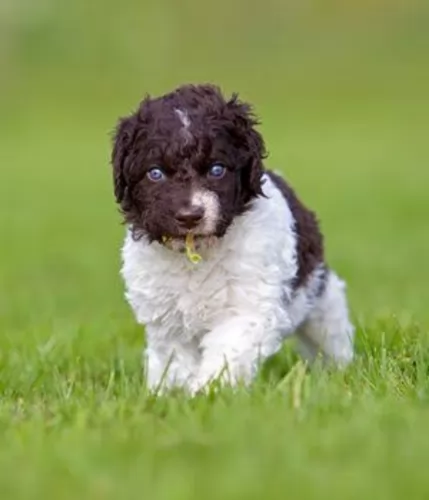 The Wetterhoun is a compact, medium sized breed weighing about 55 to 77 pounds. Great water dogs they are athletically built with low set ears hanging next to their heads, a waterproof coat, distinctive eyes with a very serious expression and a tightly curled tail held aloft over the back. Their coat is waterproof, somewhat oily, curly and thick. The fur is of a smoother texture on the ears, head, and legs. They can be solid black, solid brown, brown with white, or black with white.
The Wetterhoun is a compact, medium sized breed weighing about 55 to 77 pounds. Great water dogs they are athletically built with low set ears hanging next to their heads, a waterproof coat, distinctive eyes with a very serious expression and a tightly curled tail held aloft over the back. Their coat is waterproof, somewhat oily, curly and thick. The fur is of a smoother texture on the ears, head, and legs. They can be solid black, solid brown, brown with white, or black with white.
 Indian Bull Terriers are affectionate, playful 4-legged family members. They are loyal, protective and social and will get on well with their own human family members but not necessarily with strangers.
Indian Bull Terriers are affectionate, playful 4-legged family members. They are loyal, protective and social and will get on well with their own human family members but not necessarily with strangers.
Precautions need to be taken around visitors who aren't familiar with the dog. He is powerful and energetic and must be trained and socialized to become the obedient, loving, loyal pet he is known to be.
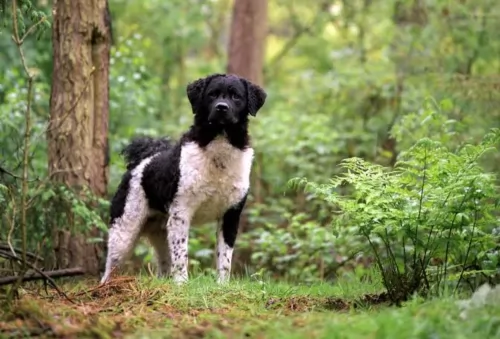 3.Adaptability – not a great apartment dog even though he is not that big. They need space. They need a job and they will finish their job at their own pace no matter what you say. It is impossible to train this trait out of them.
3.Adaptability – not a great apartment dog even though he is not that big. They need space. They need a job and they will finish their job at their own pace no matter what you say. It is impossible to train this trait out of them.
4.Learning ability Very high learning ability, very eager to learn and very smart. He is stubborn about finishing whatever job he is working on
 With love and good care, your Indian Bull Terrier can reach up to 14 years of age and even more.
With love and good care, your Indian Bull Terrier can reach up to 14 years of age and even more.
If you own the white Indian Bull Terrier, you need to keep in mind that deafness is found in many white dogs. Another concern for your white dog is sun protection. Whether white or one of the other shades, your dog has short, sparse hair and spending hours in the sun can be hazardous to him and he can suffer with serious sunburn. Serious sunburn can lead to other complications such as cancer.
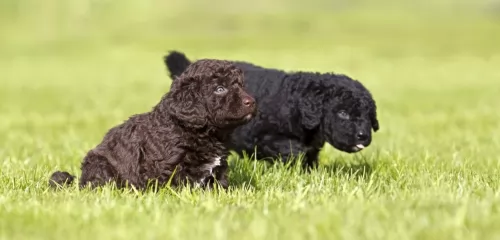 A hardy and healthy breed they do not have severe health issues. But like every his
A hardy and healthy breed they do not have severe health issues. But like every his
• Ear Infections – like any breed with hanging ears they can be prone to infection. This is particularly true because the dogs are in the water a lot. Be sure to clean and dry them after every water episode and inspect them on a regular basis even if the dog has not been in the water.
• Patellar Luxation – Knee cap issue with movement and inflammation. Can cause lameness and arthritis.
 Your Indian Bull Terrier has a short coat and he doesn't thrive in cold, damp weather. When its really cold, keep him indoors or put a sweater on when he needs to go outdoors.
Your Indian Bull Terrier has a short coat and he doesn't thrive in cold, damp weather. When its really cold, keep him indoors or put a sweater on when he needs to go outdoors.
Give him a nice, warm, dry place to sleep and ensure that if he goes outside, there is both sun and shady spots for him to lie.
This is a low maintenance dog, so a twice-weekly brush will do him the world of good. It will get rid of loose hair, he will love the closeness the brushing provides and the brushing will keep his coat shiny and healthy.
If you have a white Indian Bull Terrier, if he has dirty marks on his coat, you can just wipe him down with a damp cloth.
Remember to do regular checks on his ears and teeth too. Tooth decay can bring on a host of illnesses for your pet.
If you are going to be giving your pet commercially manufactured dog food, make sure its the best there is.
Your Indian Bull Terrier is an active dog and you want to make sure that he remains healthy and active for the 10 to 14 years that he is with you. If you're unsure as to how to feed your pet, speak to your vet.
It will always be to your pets benefit to feed him some homemade food too and cooked chicken, brown rice and pasta and vegetables will keep his eyes bright and alert. If you can, try to add in some raw meat into his kibble too as this helps to keep his skin healthy. Never ever leave him without a constant supply of fresh, cool water.
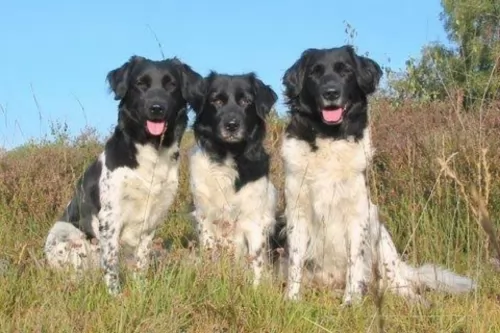 1Feeding the puppy -This is an active, hunting and swimming breed. They need good nutrition and high quality puppy food. A food formulated for active breeds or hunting dogs would be best. Feed your puppy in smaller amounts 3-4 times per day.
1Feeding the puppy -This is an active, hunting and swimming breed. They need good nutrition and high quality puppy food. A food formulated for active breeds or hunting dogs would be best. Feed your puppy in smaller amounts 3-4 times per day.
2.Feeding the adult - This is an active, hunting and swimming breed. They need good nutrition and high quality adult food. A food formulated for active breeds or hunting dogs would be best. Feed your adult twice per day.
4. Games and Exercises – This is an active working dog that needs a lot of exercise every day. A 30 minute walk is only the beginning. They need outdoor time to play and run. They need to swim if at all possible.